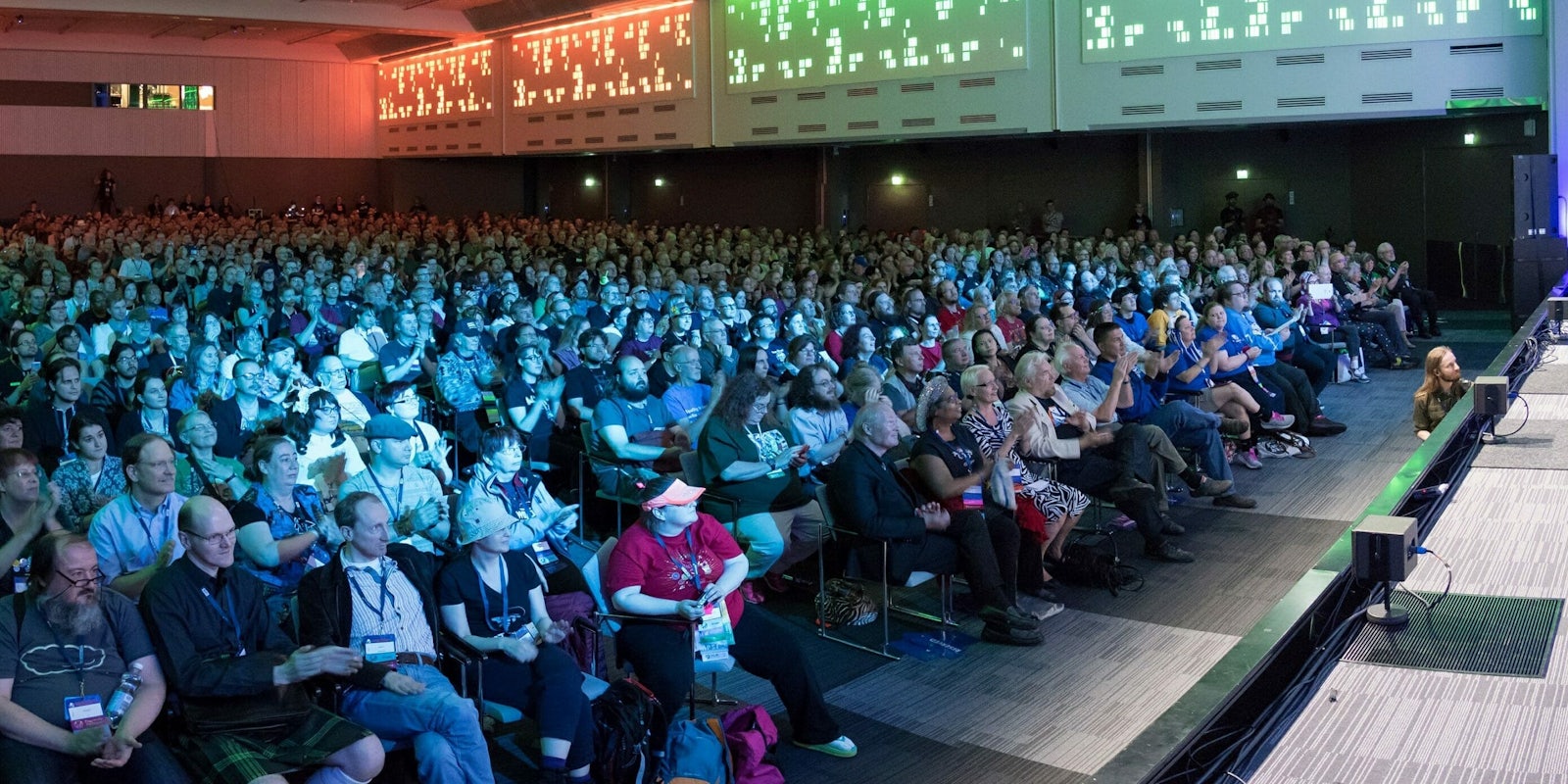Updated 7:08am CT, July 24: After more high-profile writers publicly withdrew from their convention panels, Worldcon announced that it was “tearing the program apart and starting over.” With an apology to the many attendees who made their voices heard this week, the organizers are putting together a more representative program, requesting further input from Hugo nominees.
…
Now in its 76th year, the World Science Fiction Convention (Worldcon) is still processing a culture clash between an old guard of conservative fans, and those who strive for a more inclusive community. In recent years this led to the rise of a Gamergate-esque faction who tried to sabotage Worldcon’s Hugo Awards ballot, rebelling against the increasingly diverse field of nominees.
Worldcon has voiced a desire to quash harassment and welcome new voices, but the journey hasn’t been smooth. With a month to go before Worldcon 2018 in San Jose, California, the convention is under fire for disrespecting marginalized creators, with some guests withdrawing in protest.
Among other issues, Worldcon misgendered a Hugo finalist on the convention program and rejected panels that were pitched to spotlight creators of color. In the Twitter thread below, author JY Yang (a best novella finalist) shares an email where a Worldcon organizer says there’s no #OwnVoices panel because “maybe 20% of Worldcon 76 members know what it means.” #OwnVoices is a hashtag championing marginalized creators who write from their own experiences—for instance, Asian authors writing Asian characters—and it has a significant presence on the publishing scene. It’s definitely known to plenty of Worldcon attendees, and those who don’t know might be interested to find out. That’s the point of convention panels: to learn new things.
https://twitter.com/halleluyang/status/1021238143117275136
This isn’t an event like Comic-Con. It’s a close-knit cross between a fan convention, an academic conference, and a networking party for these creators. The Hugo Awards—which are voted on by Worldcon attendees, and awarded at the convention—can make a huge impact on a writer’s career. The convention offers a unique chance to meet others in the industry, and panelists range from bestselling authors to little-known fans. People pay to travel in from around the world, and they want to be sure they won’t face discrimination when they arrive.
Worldcon also skews older than most fan conventions. There’s a core audience of predominantly white baby-boomers who have shaped the convention for decades, some of whom are not clued into contemporary social justice politics. This overlaps with a small but vocal reactionary movement. Known as the Sad Puppies (yes, seriously), they think science fiction and fantasy publishing have become too progressive, and they object to the number of women, people of color, and LGBTQ people earning recognition in the community.
Meanwhile, fans and creators from marginalized backgrounds are fighting to have their voices heard at Worldcon, which is essentially the ultimate science fiction and fantasy establishment event. It’s particularly hurtful when Worldcon does something like reject #OwnVoices as too obscure, or publicly misgendering a Hugo finalist. That’s what happened to writer and editor Bogi Takács, who has non-binary gender pronouns clearly displayed on social media, and never experienced this problem at other conventions.
I would very much appreciate a public apology from @worldcon2018 for rewriting my bio to change my name and my gender.
— Bogi Takács: POWER TO YIELD & OTHER STORIES Nov 7! (@bogiperson) July 23, 2018
I have never, ever used “he” pronouns.
After many similar exclusionary actions, this is the last straw, I am honestly not sure I can safely attend. pic.twitter.com/agazsY1rmV
Worldcon has apologized for the error and corrected the program, but this was just one of several issues that came to light over the past few days. Other attendees report having their panels given to other guests with no explanation and having their private Facebook photos copied into the program without permission.
There’s a general sense that guests who aren’t straight and white are being sidelined by the convention organizers, even if they’re literally nominated for a Hugo. That explains why Worldcon sent out a tweet on Monday asking for Hugo finalists to get in touch if they haven’t been invited to join a panel.
If you are a Hugo Finalist and were not contacted about being on program, please email program@worldcon76.org
— Worldcon 76 San Jose (@worldcon2018) July 23, 2018
We have been unable to reach some of you. All Finalists who wish to be on program will be accommodated.
Kevin Roche
Organizing a convention is a complicated process, and Worldcon’s organizers also have to contend with a culture war within its community. However, this explanation doesn’t help those who were allegedly sidelined or offended by the organizers’ behavior in private email exchanges. Several people have already withdrawn from the program in protest, including authors JY Yang, R. Lemberg, Sarah Gailey, and Alexandra Rowland.
https://twitter.com/halleluyang/status/1021378520499417088
This controversy cuts to the heart of how people perceive gatekeepers in science fiction and fantasy. When marginalized creators complain about discriminatory treatment, others often respond by asking, “Well, why not start your own convention?” But the reality is that while other conventions and awards exist, Worldcon and the Hugos are established brands with a unique cachet. It’s akin to telling queer filmmakers that they should be happy with a GLAAD award instead of an Oscar. This community is diverse, as is its top tier of emerging writers, and people aren’t going to stop demanding fair treatment. It’s just taking Worldcon a while to catch up.
Correction 10:33am CT, July 24: This article has been changed to reflect the correct full title of Worldcon: It is the World Science Fiction Convention, not the World Sci-Fi and Fantasy Convention.


